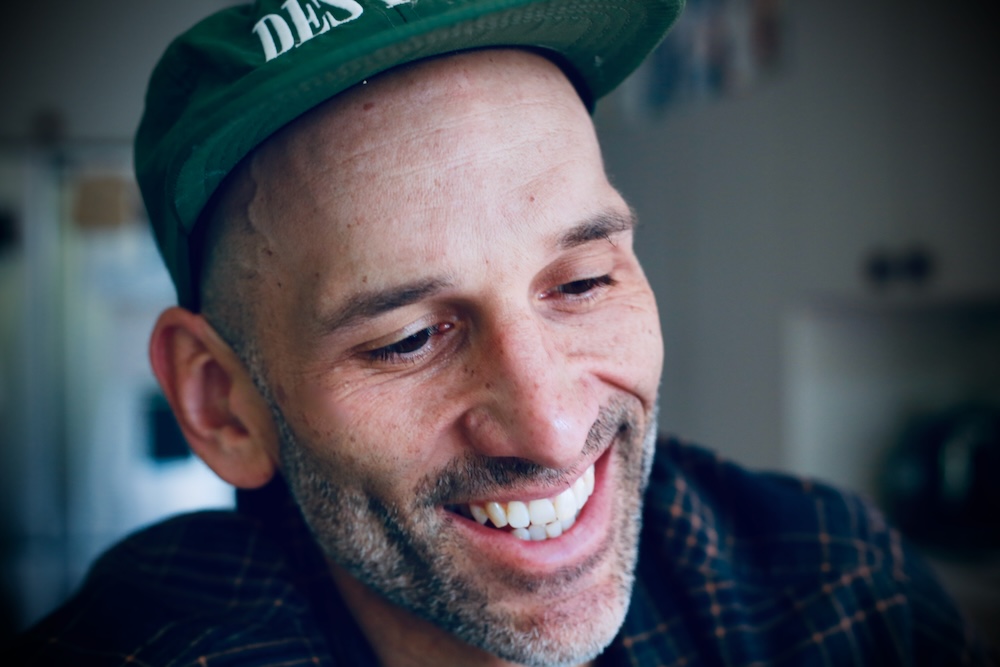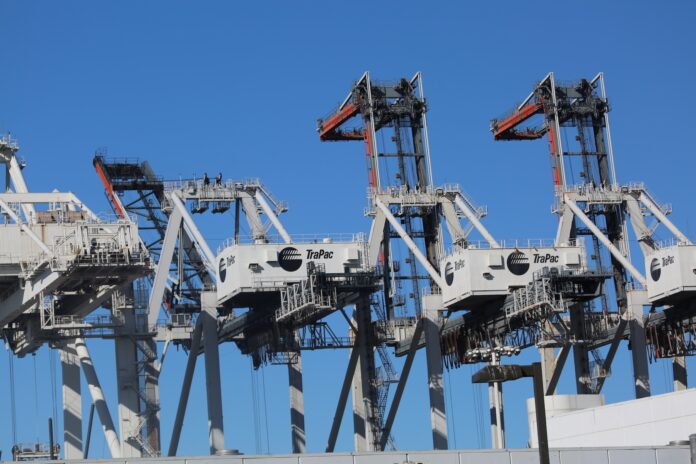Bless a book that helps you make sense of your world and where it’s headed. KQED’s Forum co-host Alexis Madrigal’s The Pacific Circuit (Macmillan, $32) is just such a book.
As a child of San Francisco, it should come as no great revelation that when I was a young one, my father belonged to a men’s group largely comprised of union guys who met up to speak of their feelings, occasionally organizing picnics in the park to gather their loved ones and grill hot dogs in a deconstructed manner. One of these blessedly pre-woke ‘90s guys was Brian, a bulky longshoreman given to sporting Hawaiian shirts and a remarkably gentle demeanor. He was the kind of adult who would ask a little girl about her day and actually listen to the answer.
Steeped in Greyhound bus driver picket lines and farmworker solidarity grape boycotts, I found it unremarkable that Brian was the president of his union (though he did tend to operate at a lower volume than the other labor leaders with which my parents consorted.) It wasn’t until much later when, upon reading this new book on the Port of Oakland and the surrounding communities that predate it, I learned the character of Brian’s 1994-2000 ILWU leadership. His administration was committed to international workers’ solidarity, and he played a pivotal role in the 1999 Seattle WTO protests, oversaw boycotts of cargo from apartheid South Africa.

Brian is one of the local leaders to whose work Madrigal points as a template for future-forward community solidarity. These are precious tidings in a 2025 that finds many of us contemplating the viability of permanent dissociation as alternative to reading headlines.
The Pacific Circuit is not exactly a labor history book, except in the way that all human history can be described by the way people have worked and the how’s and who’s behind resources being extracted from them. More accurately, the book is the tale of the last hundred-ish years of Oakland, of the way its rapacious economy carefully trampled neighbors, how they in turn crafted responses and built coalitions, and of how this clash precisely describes the state of the world today. And would you believe Tr–p isn’t mentioned once?
Instead, the troubling touchstone is post-World War II containerization, the standardization that packed the disparate goods being moved across the globe into infinite, identically shaped shipping containers. This process led to rise of the fledging Port of Oakland over the relatively inaccessible-to-trucks Port of San Francisco, and of automatization’s challenges to organized dock workers.
Containerization was born of and rendered possible a far-flung, closely linked international economy that solders China to Alameda County and innumerable other markets. Madrigal coining of the label for it, which serves as his book’s title, defines a restructuring of life whose impacts we’ve all felt.

Oakland’s ensuing shipping supremacy was also made possible by the absolute trampling of its largely Black communities in order to build out the port. Construction was followed—to this day there’s a fight to keep coal out of this equation—by endless lines of diesel-belching trucks that ferry ocean-borne televisions and whatnot to area warehouses.
Madrigal also presents readers with the devil that is Stanford Research Institute, Silicon Valley’s early underground chemical spills, the Housing and Urban Development Act of 1968 that placed real estate at the mercy of global capital, resegregation, Prologis, and myriad other beasts.
In his telling, the Bay Area is unmasked as a center of international new world order, a birthplace of a system wherein profit has superseded the nation state as ultimate authority. The painfully exposed residents of Oakland’s traditionally Black neighborhoods have been subjected to redlining and rising asthma rates, unwillingly rendered the “early adopters of the future economy.”
It comes as relief when Madrigal also locates Oakland’s futuristic forms of resistance along the Pacific Circuit. Historically, The Town has been a nexus of radical Third Worldism and of course, the land of its defiant anti-imperialist activists capable of making change on local and international levels, the Black Panthers. The longshoremen’s refusal to load scab grapes and lettuce bound for distant lands during the UFW boycott also deserves mention here.

The Pacific Circuit’s ultimate avatar for determined, community-based resistance is Margaret Gordon, or Ms. Margaret as she is known to any keyed-in Oakland resident, a grounding force in passing, just like Brian was for me across the Bay. In press for the book much has been made, and rightly so, of the years Madrigal spent learning from and about the implacable matriarch, housekeeper, environmental advocate, anti-racist crusader. Its pub date seems perfectly time to celebrate her: just five weeks ago, Gordon stepped down as co-director from the West Oakland Environmental Indicators Project, which she also co-founded.
This leader’s intersectional, decades-long work at WOEIP and beyond (Gordon was at one point appointed by Mayor Ron Dellums to the Oakland Port Commission, an all-too-rare achievement by an actual West Oakland resident) is contextualized in the book by the systemic tragedies she and her families experienced throughout their lives. Madrigal views the domestic violence that proceeded her turn to activism unflinchingly, just as he locates insider developer Phil Tagami’s humanity. He’s not down to turn his subjects into pat good and bad guys.
But Gordon is clearly this story’s hero. Her perseverance, the years she spent protecting her 14 grandkids from toxic industrial fumes, have left her far too canny to believe the techno-forward logic that the rising tide of just a little more development is needed to lift everyone’s schooner.
“All boats don’t rise, because the people here don’t have a boat. They just stand there while the water rises around their necks,” as Brian Beveridge, Ms. Margaret’s WOEIP co-founder, puts it.
Appropriately, given the book’s tight geographic scope, potential solutions for survival in Pacific Circuit are land-based. Madrigal and his activist interviewees advocate not for advisory boards, but ownership groups, such as the Sustainable Economies Law Center’s permanent real estate cooperatives. One of these, led by third-generation Oaklander and anthropologist Noni Session, has succeeded in buying the iconic, long-shuttered West Oakland community hub and watering hole Esther’s Orbit Room.
Here too is the Shuumi voluntary land tax to Indigenous communities, another practice that has been propelled in the Bay Area. The book casts a wide net in its telling of ways that local folks have built “a place where someone can unclench their fists,” as Minaz, a resident of the Wood Street houseless encampment, once expressed to Madrigal in a broadcast of his KQED program from the community, closed by the city of Oakland in 2023.
In order to form these new axes of resistance, “The first task, perhaps, is to make this system of power visible and knowable,” writes Madrigal. I repeat, The Pacific Circuit is just such a book.
Find more info on The Pacific Circuit here.








